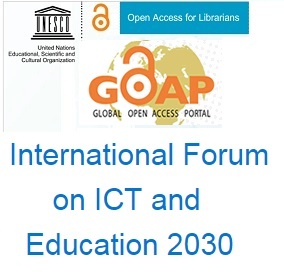UNESCO's Open Access and Education initiatives built around the Sustanaible Development Goals (SDGs)
07/07/2017


The Global Open Access Portal (GOAP) knowledge portal - launched by UNESCO in 2011 - provides an overview of the framework surrounding Open Access (OA) in UNESCO Member States in 158 countries worldwide. From 10 to 11 July, 2017, UNESCO orginizes the International Forum on ICT and Education 2030 which will be focused on harnessing ICT to achieve Sustainable Development Goal 4 for Education 2030.
|
UNESCO’s OA initiatives are built around the Sustanaible Development Goals (SDGs) to recognize the need for ensuring that scientific research addresses the needs of society and responds to current and future sustainability challenges. At least 10 out of the 17 SDGs comprising the 2030 Agenda for Sustainable Development require constant scientific input. Given that, there is an absolute need to remove restrictions in order to disseminate research outputs to intended stakeholders. UNESCO thus believes that OA has a fundamental role to support the SDGs and is committed to making OA one of the central supporting agendas to achieve the SDGs... Through its global network of Field Offices, Institutes and Centers, UNESCO facilitates the development and adoption of OA-enabling policies... UNESCO’s OA programme pays particular attention to African and other developing countries where, notwithstanding important gains in ICT availability, OA prevalence, both in terms of output and usage, remains low. Join free E-learning courses: |
The Global Open Access Portal (GOAP)
presents a current snapshot of the status of OA to scientific information in 158 countries worldwide:
# Some of the important organizations that are working in the field of OA (from Africa, Arab States, Asia and the Pacific, Europe and North America, Latin America and the Caribbean)
For countries that have been more successful in implementing OA - the GOAP portal highlights critical success factors and aspects of the enabling environment;
For countries and regions that are still in the early stages of OA development, the portal identifies key players, potential barriers and opportunities.
|
UNESCO believes that education ... ... is a human right for all throughout life and that access must be matched by quality. The Organization is the only United Nations agency with a mandate to cover all aspects of education. It has been entrusted to lead the Global Education 2030 Agenda through Sustainable Development Goal 4. # UNESCO and the Education 2030 Agenda The roadmap to achieve the SDG 4 is the Education 2030: Incheon Declaration and framework for action, in English and French. |
Related:
- Ethics of Science and Technology (UNESCO)
- ROAD : the Directory of Open Access Scholarly resources
- Guidelines on the Implementation of Open Access to Scientific Publications and Research Data
- Open Science Monitor : access to data and trends on open science
- European Data Portal (Training on the basics of Open Data)
- OpenEducationEurope (A community for all those involved or interested in digital, open and innovative education)
- Open Educational Resources: the future of Education, co-created with You
- Opening Access to Joint Research Center Data (JRC) Catalogue
- Global agriculture & nutrition community launches open publishing initiative (GODAN gateway - F1000Research)
- Free recorded Webinars@AIMS
- Access to Data from Rothamsted's Long-term Experiments on crops, soils and associated ecosystems
